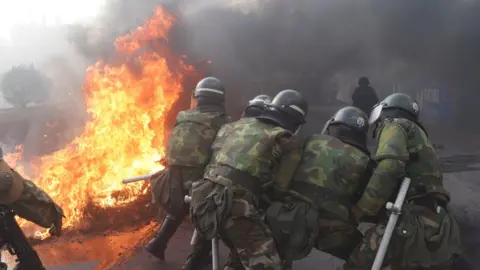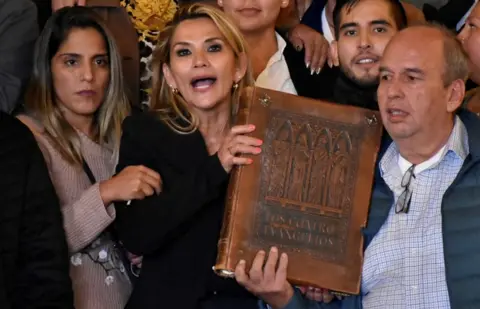Bolivia crisis: Death toll mounts amid pro-Evo Morales protests
The death toll in Bolivia continues to rise after violent clashes between security forces and supporters of former President Evo Morales.
On Friday, security forces opened fire on supporters of Mr Morales in Sacaba, killing at least eight people.
A doctor in the city told the Associated Press that most of those killed and injured had bullet wounds.
The country's national ombudsman said a total of 19 people had died since the disputed election on 20 October.
On Saturday, UN human rights chief Michelle Bachelet warned that violence in Bolivia could "spin out of control".
"Repressive actions by the authorities... are likely to jeopardise any possible avenue for dialogue," she added.
Amid claims of electoral fraud, Mr Morales resigned on 10 November and later fled to Mexico.
On Friday, before the violence in Sacaba, he told the BBC that there were no meaningful charges that could be brought against him.
 Reuters
ReutersHe was responding to interim President Jeanine Áñez, who said he could be prosecuted if he returned to Bolivia.
Mr Morales had previously said he was willing to return to Bolivia in order to restore peace. He also told US broadcaster CNN that what happened in Sacaba was "a real massacre".
Ms Áñez, who declared herself interim president on Tuesday, has already broken ties with Venezuela and is sending home more than 700 Cuban medics.
The moves are meant to show that the interim government is distancing itself from Mr Morales's regional left-wing allies.
What's the latest from Sacaba?
Hospital director Guadalberto Lara told AP that most of the killed and injured in the central town of Sacaba had bullet wounds.
Witnesses said police opened fire on protesters calling for the return of Mr Morales to Bolivia.

Separately, an AFP correspondent said five supporters of the former president were killed, after seeing their bodies at a local hospital. The deaths were later confirmed by interim minister Mr Justiniano to local journalists.
On Saturday, three more deaths were confirmed.
Also on Friday, riot police fired tear gas to disperse protesters in La Paz, the country's administrative centre,
Mr Morales, 60, has said he was forced to stand down but did so willingly "so there would be no more bloodshed".
But his resignation triggered clashes around Bolivia between his supporters and police.
What did Evo Morales say?
In Friday's interview with BBC Mundo, Mr Morales said: "What charges can they bring against me? Electoral fraud?
"Do I administer the electoral commission?" he continued, arguing that several members of that body were key opposition figures.
Mr Morales also rejected the idea that he could be banned from any future vote.
"If I want to return, it's 'Evo can't come back'. Why so much fear of me?" he asked.
How did Jeanine Áñez become leader?
Ms Áñez, 52, is a qualified lawyer and a fierce critic of Mr Morales. She was previously director of the Totalvision TV station, and has been a senator since 2010.
As the deputy Senate leader, Ms Áñez took temporary control of the body last Tuesday after Bolivia's vice-president and the leaders of the senate and lower house resigned.
 EPA
EPAThat put her next in line for the presidency under the constitution.
The appointment of Ms Áñez, an opposition senator, as interim leader has been endorsed by Bolivia's Constitutional Court.
Ms Áñez has said she wants to hold elections as soon as possible, denying that took place against Mr Morales.
The US has recognised her as the leader, saying it looks forward to working with Bolivia's interim administration.
Mr Morales has branded Ms Áñez "a coup-mongering right-wing senator" and condemned the US recognition of her interim rule.
In the country, reaction to Ms Áñez's assumption of power has been mixed.
How did we get here?
Mr Morales, a former coca farmer, was first elected in 2005 and took office in 2006, the country's first leader from the indigenous community.
He won plaudits for fighting poverty and improving Bolivia's economy but drew controversy by defying constitutional limits to run for a fourth term in October's election.
Pressure had been growing on him since contested election results suggested he had won outright in the first round.
The result was called into question by the Organization of American States (OAS), a regional body, which had found "clear manipulation" and called for the result to be annulled.
In response, Mr Morales agreed to hold fresh elections. But his main rival, Carlos Mesa - who came second in the vote - said Mr Morales should not stand in any new vote.
The chief of the armed forces, Gen Williams Kaliman, then urged Mr Morales to step down in the interests of peace and stability.
Announcing his resignation, Mr Morales said he had taken the decision in order to stop fellow socialist leaders from being "harassed, persecuted and threatened".
